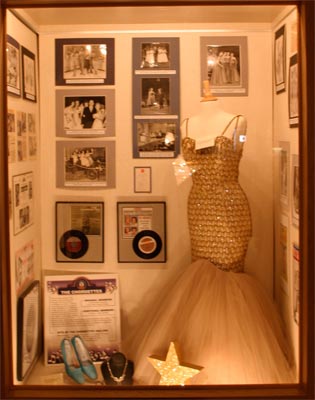 |
||||||
The Chordettes (Inducted 2001)
|
 The Chordettes display at The Vocal Group Hall of Fame. |
|||||
Early in that year Archie Bleyer, musical director for Godfrey, started his own record company called Cadence (it could have been dubbed Julius LaRosa Records since the first eight releases were all by the Brooklyn-born singer). The tenth single, in April 1954, was by The Chordettes as Bleyer felt there was room on records for another Andrews or McGuire Sisters. The girls’ first release, “It’s You, It’s You I Love,’ went nowhere, but their second single, a lilting pop lullaby titled “Mister Sandman,” took off (helped by TV exposure) and went all the wan to number one in the U.S. and to number 11 in England. With seven weeks at the top and 20 weeks on Billboard’s Best Seller chart, “Mister Sandman” and The Chordettes were on top of the recording world. It was all the more embarrassing when their next two singles failed to chart at all; it wasn’t until January 1956 that another Chordettes recording, “The Wedding,” hit the top 100, though it quickly dropped from the list. It was during this drought that The Chordettes decided to take the rout of other white pop artists on the early ‘50s: when all else failed, cover a black artist’s song and ride it up the chart. Thus The Teen Queens’ “Eddie My Love” became The Chordettes’ first top 20 record in two years. (The Teen Queens' version fought it to a tie at number 14 Pop in the spring of 1957.) The girls’ seventh single became one of their biggest yet, as “Born to Be with You” hit number five in the summer stateside and number eight in the U.K. The group’s most remarkable quality seemed to be its survivability. Every time they were written off as another too-sweet-for-the-times female group, they would emerge with another hit, straddling the fence between the pop world and the emerging rock and roll audience. After “Lay Down Your Arms” (#16,1956) b/w “Teenage Goodnight” (#45) had a successful run, two more singles failed before the success of another two-sider, “Just Between You and Me” (#8, 1957) b/w “Soft Sands” (#73). Then their next single failed to chart. If fact the only two back-to-back top 20 records in their career were “Born to Be With You” and “Lay Down Your Arms.” In the spring of 1958 they burst onto the scene with a sound that both mature pop audiences and rock teens could like, embodied in “Lollipop.” With its chime intro and verse like a sing-along children’s song, it was soon a number one hit from Malibu to Main (and number six on the U.K. charts). Four of their next five singles were charters, including the theme from the popular TV show “Zorro” (#17, 1958) and the theme from the film Never On Sunday (#13, 1961). One that didn’t make it but should have was the haunting Glenn Yarbrough folk song “All My Sorrows” in 1962. By then, however, the group had become passé – not hip enough for the emerging rock and roll set. But The Chordettes accomplishments were enviable (14 chart records and four top 10s in 22 releases) and their professionalism and attraction were undeniable. Archie Bleyer thought so. He even went as far as to marry one (Janet). |
||||||
| Discography - A Side / B Side | Label / Cat No. |
Date |
||||
 |
||||||